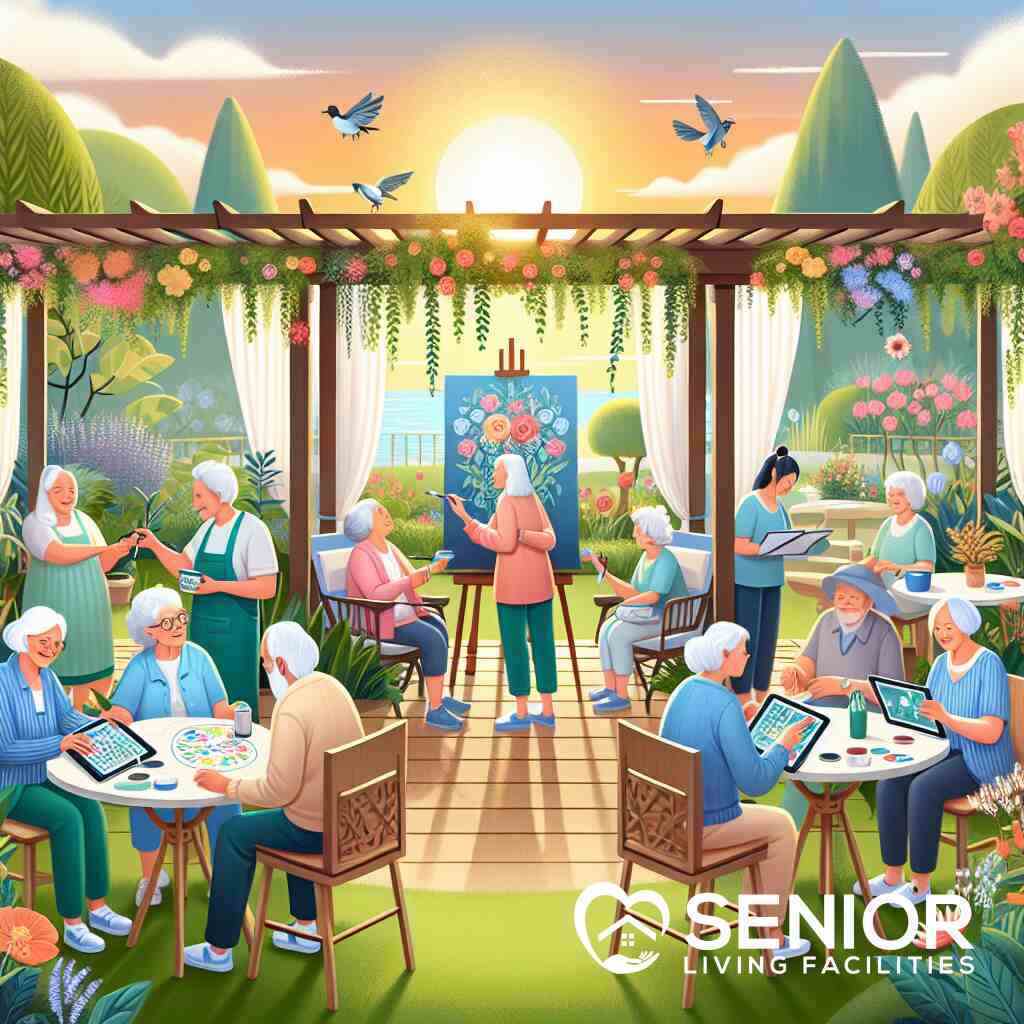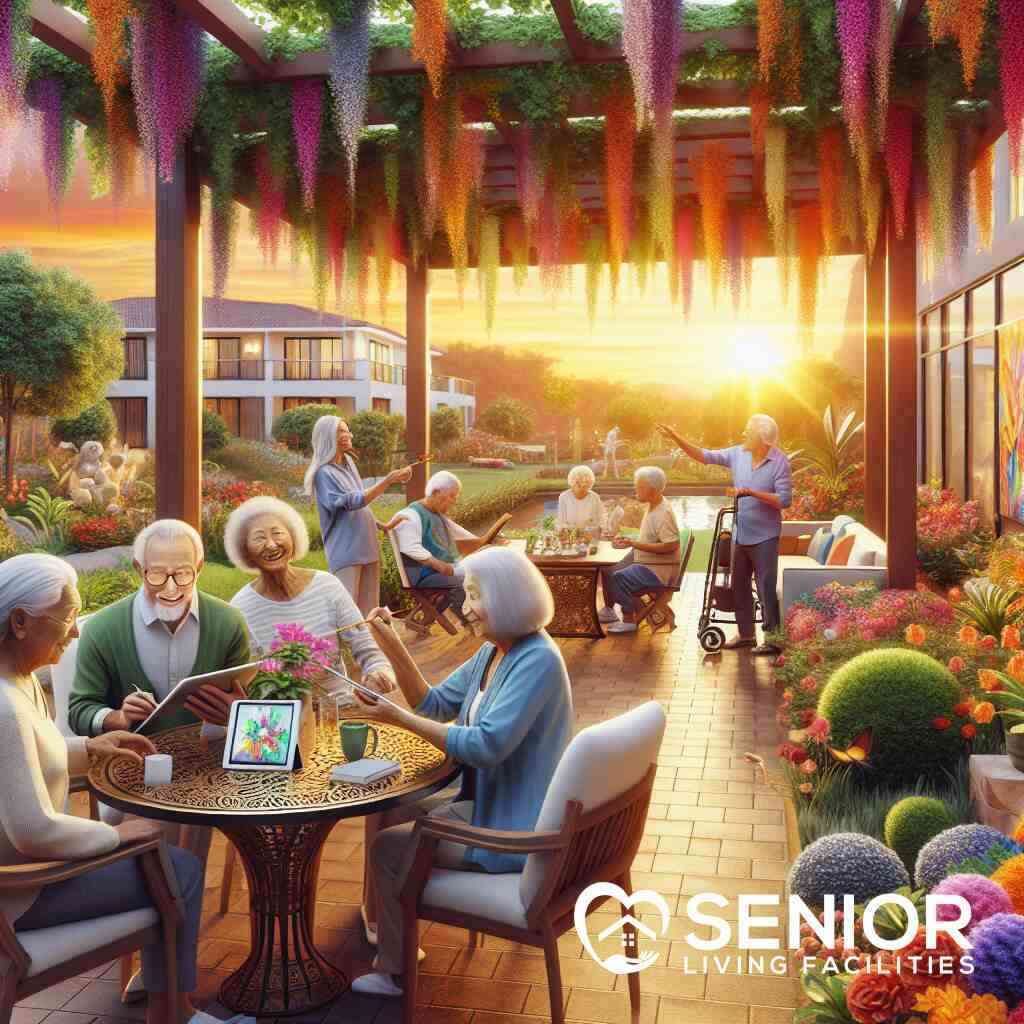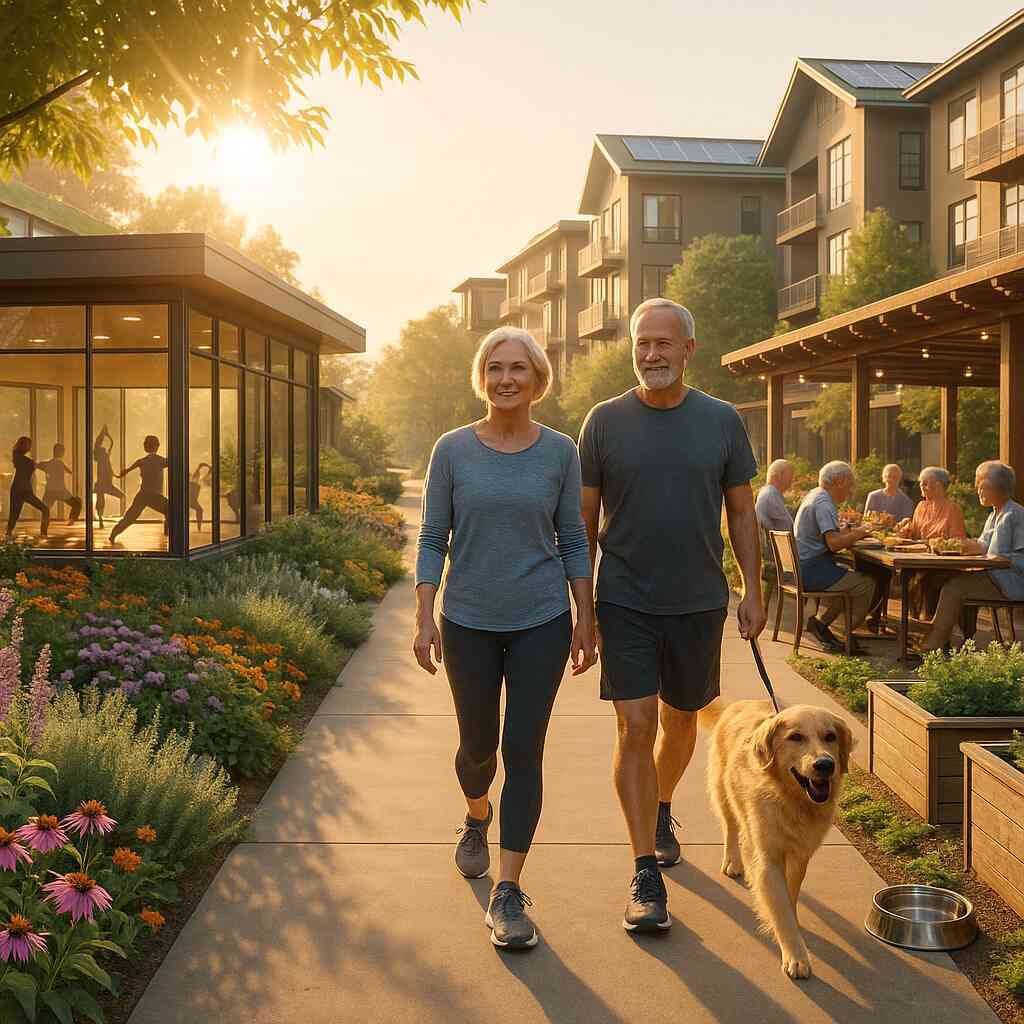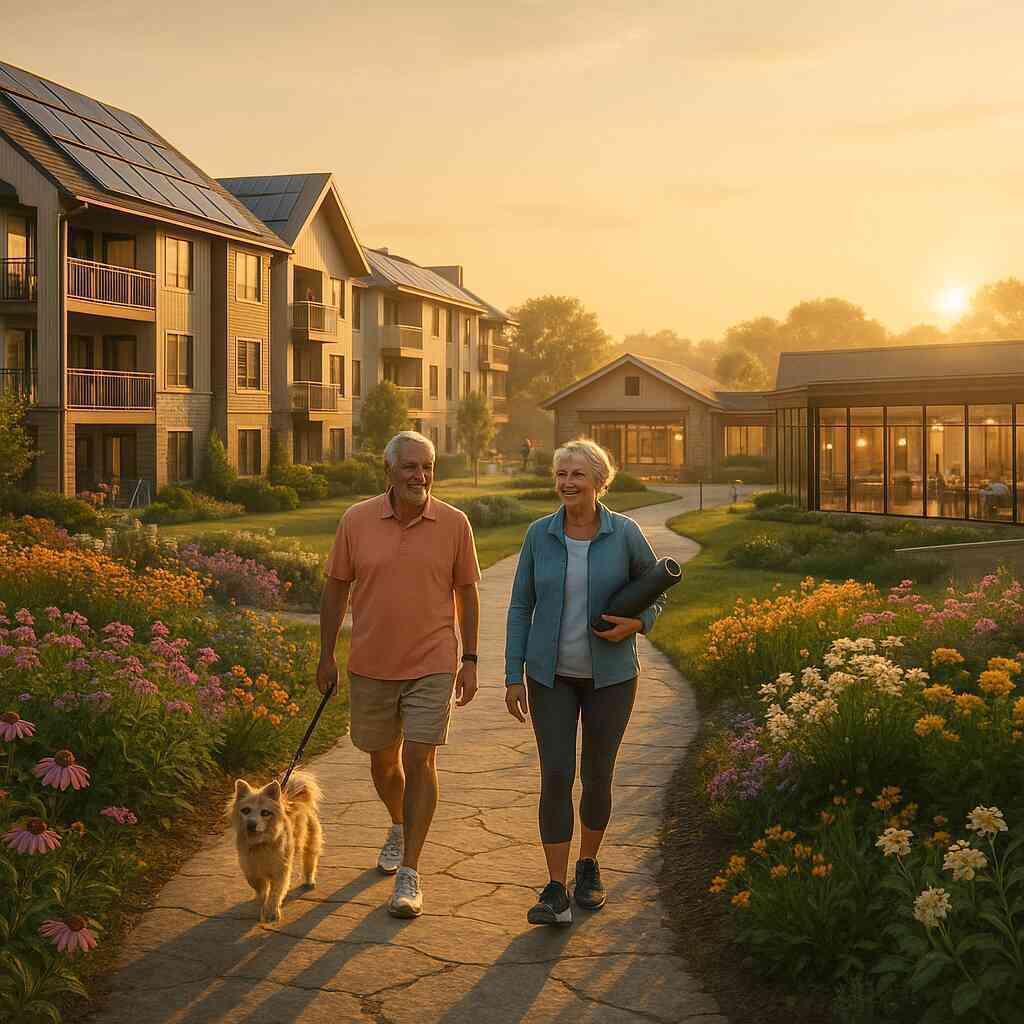
What Does Cognitive Care Mean in Modern Senior Homes?
September 30, 2024
Introduction: The Rise of Cognitive Care in Senior Living Facilities
Understanding Cognitive Health
As the population ages, understanding cognitive health becomes crucial for senior living communities. Cognitive health focuses on the brain’s ability to function efficiently in areas like memory, learning, decision-making, and attention. It is not just about preventing cognitive decline; it aims to enhance cognitive functioning, promoting a better quality of life. Senior living facilities are increasingly recognizing the importance of catering to cognitive health and and providing specialized programs and services to support seniors. Emphasizing cognitive health is not a trend but a necessity as more seniors seek environments that prioritize their mental well-being. The emphasis is on maintaining and enhancing cognitive abilities through various strategic interventions.
The Importance of Cognitive Care for Seniors
Cognitive care is paramount as it directly affects seniors’ overall health and quality of life. As cognitive decline can lead to challenges in daily activities, mental wellness, and social engagement, the role of cognitive care is essential. Modern senior homes have recognized that proactive cognitive care can mitigate the risks of conditions like dementia and Alzheimer’s disease. It not only addresses memory loss concerns but also includes activities and therapies that enhance brain function. Providing comprehensive cognitive care ensures seniors lead fulfilling lives, maintain social connections, and enjoy daily activities. Senior living facilities must prioritize cognitive care as part of their core offerings to meet the growing needs of their residents.
How Modern Senior Homes Are Adapting
Modern senior homes are adapting by integrating innovative cognitive care strategies into their daily operations. Facilities are adopting technology and personalized approaches to support cognitive health, often tailoring programs to individual needs. Memory care programs and cognitive stimulation therapies are becoming standard, reflecting the shift toward specialized care. Senior living communities today are not just places to reside but environments fostering mental and social health. By redesigning spaces for cognitive stimulation and hiring trained staff, these facilities ensure a supportive atmosphere for seniors. As more seniors seek modern senior living with cognitive care, homes adapt by embracing both traditional and cutting-edge techniques to deliver unparalleled care.
What is Cognitive Care
Definition and Scope
Cognitive care in senior living communities refers to organized efforts designed to support and enhance the mental abilities of residents. It includes activities and therapies aimed at maintaining and improving cognitive functions such as memory, problem-solving, and decision-making skills. The scope of cognitive care extends beyond traditional healthcare services, incorporating a holistic approach to mental wellness. By addressing both the clinical and non-clinical aspects of cognitive health, senior living facilities ensure a comprehensive support system for their residents. It’s essential to embrace cognitive care as a core component of elder care, reflecting the growing trend toward understanding cognitive care in senior homes.
Cognitive care encompasses various practices, including memory enhancement activities and personalized cognitive health services. These practices are geared towards creating an enriched living environment, thus facilitating active mental engagement among seniors. This preventive approach seeks to delay or reduce the onset of cognitive decline by providing targeted interventions. By fostering a supportive environment where seniors can thrive, cognitive care contributes significantly to their overall well-being. Such care is critical for maintaining high-quality life standards and facilitating independent living among seniors.
Differentiating Cognitive Care from General Care
While general care in senior living facilities includes basic health and daily living support, cognitive care specifically targets the brain’s health and wellness. General care covers a broad spectrum, including medical services, nutrition, and physical healthcare; cognitive care zeroes in on mental acuity and functionalities. One of its primary objectives is to stimulate the mental processes of the elderly, promoting active brain functions. By focusing on cognitive enhancement programs for the elderly, senior facilities can tailor their approach to meet specific mental health needs.
Cognitive care involves specially designed programs that go beyond routine care tasks, engaging residents in activities that challenge and stimulate their minds. The unique differentiation lies in its targeted aims to minimize the progression of cognitive impairments such as dementia and Alzheimer’s disease. Such care is intricate and requires specialized knowledge and skills from caregivers. The implementation of these programs involves a structured approach, customized to individual health needs, assisting in maintaining or even improving mental capabilities.
The Goals of Cognitive Care in Senior Living Communities
The goals of cognitive care in senior living communities are diverse, aiming to enhance brain health, slow cognitive decline, and boost life quality. These goals include improving memory retention, fostering mental agility, and encouraging social participation among residents. By employing cognitive therapy in retirement communities, care providers can establish proactive programs to reach these goals.
One of the foremost objectives is to provide a living environment that encourages social interaction and mental stimulation. Through these efforts, senior living communities aspire to support a lifestyle that incorporates cognitive wellness in senior living communities. The overarching aim is to ensure that seniors not only live longer but also enjoy fuller, more satisfying lives. By prioritizing mental wellness, these facilities strive to offer residents the tools and resources needed to thrive cognitively.
Cognitive care also aims to alleviate the effects of loneliness and isolation, which can contribute negatively to mental health. By deploying comprehensive mental support systems, these facilities foster a nurturing environment, ensuring residents maintain a sense of belonging and purpose. Ultimately, cognitive care goals align with the broad mission of enhancing seniors’ quality of life through holistic mental well-being strategies.
Components of Cognitive Care in Modern Senior Homes
Memory Care Programs
Memory care programs play a crucial role in cognitive care within senior homes, particularly focusing on residents with conditions like dementia and Alzheimer’s. These programs are typically housed in specialized units designed to provide a safe and stimulating environment. Activities in memory care programs aim to promote mental engagement and draw on long-term memories to support cognitive function. Music therapy, art creation, and reminiscence activities are common components that help evoke memory recall in a supportive setting. These programs are integral to a broader approach to cognitive wellness in senior living communities by fostering mental stability and participation.
Cognitive Stimulation Therapy
Cognitive Stimulation Therapy (CST) is an evidence-based intervention that provides structured and engaging activities intended to improve cognitive and social functions. Senior homes utilize CST to maintain and potentially enhance cognitive abilities, creating tailored sessions that meet the needs of residents. Activities involve exercises and tasks that encourage the use of reasoning, memory, and conversation skills. The structured design of CST allows for repeated sessions that are adaptable to various cognitive levels. Integrating CST into daily routines in senior living facilities illustrates the commitment to improving cognitive health in the elderly, allowing seniors to maintain social connections and cognitive engagement.
Personalized Cognitive Health Plans
Developing personalized cognitive health plans is a cornerstone of effective cognitive care. These plans are tailored to each resident’s cognitive abilities, preferences, and health needs, providing individualized interventions. The plans are reviewed and adjusted regularly based on the resident’s progress and feedback, ensuring a bespoke approach that aligns with their evolving needs. By leveraging personalized cognitive health services, senior homes can deliver customized experiences that enhance cognitive resilience and quality of life. This personalized focus ensures that each resident receives appropriate attention and support to maintain mental acuity.
Innovative Cognitive Activities
Innovative cognitive activities are at the forefront of modern senior home offerings, designed to engage residents and foster brain fitness creatively. Such activities often incorporate technology, including apps and platforms that offer games and exercises aimed at enhancing cognitive skills. Virtual reality experiences are gaining popularity, allowing seniors to engage in immersive environments that stimulate learning and memory. Additionally, collaborative activities such as community projects or group learning sessions offer dynamic ways to improve mental agility. The adoption of such novel approaches in senior living reflects the growing recognition of brain health and fitness in senior homes, ultimately aiming to enrich the daily lives of residents through stimulating mental exploration.
Benefits of Cognitive Care for Seniors
Improved Mental Health
Cognitive care significantly influences mental health by providing seniors with activities that engage and stimulate their brains. This proactive engagement helps reduce symptoms of depression and anxiety, which are common in older adults. By emphasizing cognitive wellness, seniors experience a positive shift in their mental well-being. Furthermore, seniors participating in well-structured cognitive enhancement programs for the elderly often report improved mood and greater satisfaction in daily life. The emphasis on mental health becomes a cornerstone, providing the elderly with a robust framework to combat psychological challenges.
Slowing Down Cognitive Decline
Incorporating cognitive care strategies can effectively slow down the progression of cognitive decline commonly associated with aging. Strategies such as memory care programs and targeted therapy sessions offer a structured approach to maintaining mental agility. By identifying specific cognitive areas needing attention, these programs allow seniors to exercise their mental faculties consistently. Engaging in regular cognitive activities ensures the brain stays active, which can delay the onset of degenerative conditions like dementia. For many, cognitive support in senior living facilities provides a preventive measure that helps sustain cognitive functionality over time.
Enhanced Quality of Life
Cognitive care directly enhances the quality of life for many seniors, giving them the confidence to engage in daily tasks with independence. Seniors benefit from improved problem-solving skills and sharper mental acuity, facilitating better decision-making in everyday situations. As a result, they can maintain autonomy longer, contributing to a sense of fulfillment and purpose. The emphasis on personalized cognitive health plans also means seniors receive care tailored to their unique needs, ensuring they gain the maximum benefit from supportive interventions. In essence, cognitive care paves the way for a more enriched and vibrant life experience.
Social Engagement and Support
Cognitive care also fosters social engagement, countering loneliness and isolation that can affect seniors’ mental health. Through structured group activities and social interaction programs, seniors are encouraged to connect and communicate more effectively. These interactions nurture a community spirit, creating bonds among residents and staff alike. Seniors living in environments with strong cognitive support systems frequently enjoy a more active social life, leading to friendships that enhance their overall well-being. Cognitive-focused activities are often designed to encourage social participation, further strengthening the social fabric within senior living communities.
Integrating Cognitive Care into Senior Living Facilities
Role of Skilled Care Teams
Skilled care teams are pivotal in delivering high-quality cognitive care within senior living facilities. These teams, comprising experienced professionals, bring expertise crucial to addressing the complex cognitive needs of seniors. Their role includes conducting assessments to understand individual cognitive levels, allowing for tailored interventions. By maintaining open lines of communication, they ensure that families are well-informed about their loved one’s care plan. Additionally, skilled care teams work collaboratively with other healthcare providers to offer a seamless and comprehensive care experience. Ultimately, they are the backbone of cognitive care, providing the support necessary for seniors to thrive.
Training and Development for Staff
Continual training and development for staff are essential to ensure effective cognitive care in senior living communities. Training programs focus on equipping staff with the skills needed to deliver specialized cognitive support. These programs often cover topics on the latest research in cognitive health, techniques in memory care, and strategies for engaging residents. Development opportunities also foster empathy and understanding, crucial traits for interacting with seniors facing cognitive challenges. By investing in staff education, facilities not only enhance the quality of care but also increase job satisfaction by empowering their workforce. Such commitment to training ensures that staff members are always prepared to meet the evolving needs of their residents.
Use of Technology in Cognitive Care
Technology plays a transformative role in enhancing cognitive care in modern senior homes. Innovative tools such as digital platforms and apps provide seniors with engaging activities designed to boost their cognitive abilities. Tablets and computers loaded with memory games and cognitive exercises enable residents to engage actively, promoting brain health. Virtual reality is another cutting-edge technology gaining traction, offering immersive experiences that stimulate learning and memory. Facilities incorporating technology into their cognitive care strategies demonstrate a forward-thinking approach, aligning with the rise of cognitive enhancement programs for the elderly. This integration not only modernizes care but also makes it more effective and engaging for residents.
Designing Spaces for Cognitive Health
Designing spaces that promote cognitive health is a fundamental aspect of modern senior living facilities. Thoughtful layouts incorporate elements that stimulate mental activity and foster independence among residents. Features such as clear signage, color-coded pathways, and sensory gardens provide navigational support while enhancing the living environment. These spaces prioritize safety without compromising the resident’s dignity, promoting a sense of empowerment. Common areas encourage social interaction, which is vital for cognitive health, while quiet zones offer tranquility for reflection and relaxation. By intentionally designing environments that cater to cognitive needs, senior living communities create nurturing atmospheres conducive to mental wellness and engagement.
Choosing the Right Senior Living Community for Cognitive Care
Assessing Cognitive Care Services
When choosing a senior living community with exemplary cognitive care, start by analyzing the specific services offered. Evaluate whether the community provides comprehensive cognitive care plans, which include therapies and activities tailored to cognitive health needs. Look for facilities with specialized programs, such as cognitive therapy sessions designed to stimulate and preserve mental functions. Understanding the breadth of services can significantly influence the choice, ensuring they align with your loved one’s cognitive health requirements. This assessment helps identify communities uniquely equipped to deliver personalized cognitive care for seniors, making it a crucial step in the selection process.
Questions to Ask Senior Living Facilities
To ensure a facility is the right fit, prepare a list of questions to ask during visits or tours. Please inquire about the specific cognitive care programs and how they differentiate from standard care services. Ask about the frequency and type of memory enhancement activities for seniors, which are integral to maintaining mental vitality. Additionally, inquire about the staff’s qualifications concerning cognitive care and whether continuous training programs are offered. Understanding the level of expertise present ensures that residents receive the best possible care for their cognitive needs. These questions help gather essential information, guiding families to make confident decisions for their loved ones.
Evaluating the Environment and Staff
The environment and staff play vital roles in delivering effective cognitive care. Observe the community’s layout and amenities, ensuring they foster cognitive health through interactive and engaging spaces. Consider whether the facility incorporates design elements that support cognitive functions, such as color coordination and ample sensory stimuli. Additionally, staff interactions with residents should be assessed, and compassionate and patient communication should be looked for, which is crucial for effective cognitive enhancement. Evaluating these aspects gives insight into whether the community can provide a nurturing setting conducive to cognitive health.
Making an Informed Decision
To make an informed decision, weigh the gathered information about each senior living community’s cognitive care capabilities. Compare options based on the depth of their cognitive support services, including any unique therapeutic programs they offer. It’s also beneficial to consider the community’s reputation and feedback from current residents and families about their experiences with cognitive care. This comprehensive evaluation ensures that the chosen community can provide high-quality care, meeting both the cognitive and emotional needs of residents. By making a well-informed decision, families can ensure their loved ones thrive in an environment tailored for cognitive health and overall well-being. Consider facilities like those found in senior living facilities in California, which offer diverse and robust cognitive care services.
Case Studies and Real-Life Examples
Successful Cognitive Care Programs
Senior living communities have implemented successful cognitive care programs that distinctly enhance residents’ mental functions and daily living experiences. For instance, certain facilities have adopted cognitive stimulation therapies that integrate memory enhancement activities for seniors with art, music, and technology, fostering alertness and enthusiasm. Tailored interventions in some communities have resulted in remarkable stability in cognitive abilities over extended periods. Senior living facilities in Texas exemplify successful program implementations with diverse cognitive care strategies benefiting countless residents.
These programs’ core strength lies in their structured approach, ensuring activities are engaging and beneficial, addressing individual mental health needs effectively. By regularly updating these programs to incorporate new scientific insights, facilities maintain their residents’ cognitive vitality, offering them higher-quality lives. This trend is increasingly common across senior living communities, embracing innovative practices that prioritize mental wellness.
Individual Stories of Improvement
Individual stories highlight the profound impact cognitive care programs have on seniors’ lives. Take, for example, a resident at a modern senior home who engaged in cognitive support in senior living facilities where personalized brain exercises significantly improved mental acuity. This resident saw increased confidence in performing daily tasks and improved social interaction, dramatically enhancing their quality of life.
Another compelling case involved a senior participating in a digital platform designed for cognitive engagement. The strides made in this environment were impressive, with the resident experiencing noticeable cognitive enhancement. Their increased ability to recall past events and improved problem-solving skills serve as a testament to the program’s efficacy. These stories underscore the potential of cognitive care to give seniors invaluable improvements in mental health.
Lessons Learned and Best Practices
Analyzing these cases reveals crucial lessons and best practices for cognitive care programs in senior homes. One significant insight is the necessity of senior living cognitive support systems that adapt to the evolving needs of residents, offering consistent, personalized care. Regular assessment and customization of programs play vital roles in ensuring effective cognitive health improvements.
Another lesson is the importance of integrating newer technologies and methodologies to keep residents engaged. Facilities that adopt a holistic approach, balancing traditional methods with modern innovations, generally see the best outcomes. Moreover, ensuring skilled care teams receive ongoing training ensures that staff can deliver tailored interventions effectively, reinforcing the importance of informed and dynamic caregiving strategies.
Overall, the focus remains on recognizing each resident’s unique cognitive needs, leveraging a range of tools and insights to optimize their cognitive health journey.
Conclusion: The Future of Cognitive Care in Senior Living
Emerging Trends and Innovations
Cognitive care in senior living communities is evolving with innovative approaches. These trends include integrating cutting-edge technology, like virtual reality and AI tools, to enhance cognitive abilities. Institutions are also embracing design elements that promote cognitive health, creating environments that stimulate mental activity and support independence. As peer-reviewed studies reveal more about brain health, cognitive therapies in retirement communities significantly improve, offering tailored solutions for seniors. Additionally, care models are shifting towards holistic approaches, ensuring both physical and mental wellness are addressed in unison. This continuous evolution promises comprehensive cognitive enhancement, positioning modern senior homes at the forefront of elder care.
The Growing Need for Specialization
There’s a mounting demand for specialized cognitive care in senior living facilities, driven by the rising prevalence of cognitive impairments among the aging population. Recognizing this, facilities focus on developing specialized programs like memory enhancement activities for seniors to meet the complex needs of their residents. Skilled care teams are increasingly receiving advanced training, ensuring expertise in dealing with diverse cognitive conditions. This specialization also addresses the needs of individuals requiring personalized care, offering tailored interventions for the best possible outcomes. It emphasizes that senior living providers must remain agile and informed, ready to adapt to emerging trends and scientific advances in cognitive therapy and support.
Final Thoughts on Cognitive Care for Seniors
Cognitive care emerges as a cornerstone of senior living, ensuring that aging individuals maintain mental acuity and enjoy quality life experiences. As facilities continue to develop and refine their cognitive care offerings, the emphasis remains on holistic support that values both mental and social health. This comprehensive approach aids seniors in maintaining independence and vitality, reinforcing the value of cognitive wellness in our communities. Recognizing and responding to the unique needs of seniors through expert-driven programs allows for enriched experiences within these communities. For families considering senior living, understanding cognitive care options becomes crucial, ensuring their loved ones receive the highest standard of care possible, like those provided by senior living facilities in New York, renowned for their advanced cognitive care programs.
Frequently Asked Questions
Question: How do Senior Living Facilities support cognitive care for seniors in modern senior homes?
Answer: Senior Living Facilities focuses on providing comprehensive cognitive care for seniors through its diverse range of senior living communities. Our communities are equipped with specialized programs like memory care and cognitive stimulation therapy designed to enhance cognitive wellness. We prioritize creating environments that support personalized cognitive health, ensuring each resident receives tailored interventions that foster mental engagement and brain health for seniors. By offering cutting-edge strategies and skilled care teams, Senior Living Facilities ensure that seniors experience a high standard of cognitive support, which is essential for a fulfilling and independent life.
Question: What Should I Look for in a Senior Living Community Concerning Cognitive Care?
Answer: When evaluating a senior living community for cognitive care, consider the range and quality of services provided. Senior Living Facilities emphasize the availability of cognitive care in senior homes by integrating comprehensive memory care programs and cognitive therapies. Look for facilities that offer a blend of innovative cognitive activities and personalized cognitive health plans tailored to individual needs. The environment should facilitate cognitive wellness and include trained staff dedicated to promoting mental health for seniors. By choosing a community within our network, you can be assured of finding a supportive setting that prioritizes cognitive enhancement for seniors.
Question: How do Senior Living Facilities incorporate innovative cognitive activities in their care approach?
Answer: At Senior Living Facilities, we incorporate innovative cognitive activities aimed at engaging and stimulating seniors’ mental faculties. These activities include using technology such as virtual reality to offer immersive experiences and digital platforms that provide games to enhance brain health for seniors. Our communities focus on delivering personalized cognitive care that fosters mental agility and social interaction. By integrating such innovative approaches, we enhance the quality of cognitive care, ensuring seniors remain mentally active and socially engaged, thereby improving their overall quality of life.
Question: What makes the cognitive care services of Senior Living Facilities stand out in modern senior homes?
Answer: The cognitive care services offered by Senior Living Facilities stand out due to their holistic and personalized approach. We provide comprehensive cognitive wellness strategies, including cognitive stimulation therapies and memory enhancement activities. Our facilities are designed to promote mental wellness, with spaces that facilitate social interaction and cognitive engagement. With experienced, skilled care teams dedicated to addressing the unique needs of each resident, our focus remains on delivering exceptional cognitive therapy and support. This ensures that residents not only maintain their cognitive health but also enjoy a robust and fulfilling lifestyle in our senior living communities.
Question: What Does Cognitive Care Mean in Modern Senior Homes at Senior Living Facilities?
Answer: Cognitive care in modern senior homes at Senior Living Facilities encompasses a comprehensive approach to supporting and enhancing cognitive health. It involves a range of services, including memory care programs, personalized cognitive health plans, and the integration of innovative cognitive activities. Our communities are equipped with resources and skilled professionals dedicated to fostering an environment conducive to cognitive wellness. By focusing on the mental and social health of seniors, we ensure that our residents lead enriched lives, embracing both traditional and cutting-edge care strategies for optimal cognitive enhancement.




